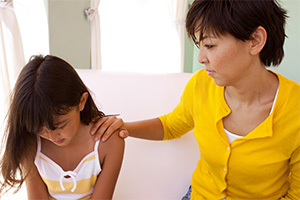How to Talk to Your Child About Scary Events

Too often, it seems that every other headline is about terrorist attacks, school shootings, or other horrible events. Children with ADHD, especially those with co-occurring anxiety, may need your help to cope with these scary events.
As much as you try to shield your children from disturbing news reports, many young people find out about such scary events at school from their classmates. School can already be a source of anxiety for children with ADHD, who can also have emotional and social struggles. Providing them with the emotional support they need can be challenging when you’re also faced with frightening news.
How do you, as a parent, comfort and help your children and talk to them about scary events?
Advice for Parents
Susan Vosburgh, a former director of the National Resource Center, is a clinical social worker who previously developed district-wide school programs for crisis response.
“Children are very good at picking up on the emotions of their parents,” Ms. Vosburgh said. “If you’re upset and concerned, they may sense it. Tell them that it’s okay to be frightened or sad and that you may have similar feelings. Find ways to comfort them and tell them you will do all you can to keep them safe.”
Turn Off the Television and Limit Other News Coverage
The news reports tend to focus on the sensational aspects of tragic events, giving people the most dramatic coverage. Even if you don’t watch the news, special announcements can interrupt regular network programs to bring updates. The Internet can also be filled with constant coverage. Studies show an association between the amount of coverage children watch following tragic events and increased symptoms of stress. It’s best to limit your child’s exposure to the news.
Answer Children’s Questions Based on Their Age
Provide your children with emotional support and age-appropriate answers to their questions. When young children ask about the news, assure them that they are safe and give them basic information without providing unnecessary details.
These questions may be helpful to ask:
- What do you mean when you ask…?
- What do you think about what happened?
- What can I do to make you feel safer?
Older children may need more information. Ask them what they already know and what they want to know from you. The same questions above can help when talking to older children. Older children, and adults, do not benefit from graphic and sensational coverage on the media. If children watch the news at all, watch with them and answer their questions. It may be helpful to turn off the television and disconnect from the Internet when news coverage is most intense.
“Focus on the Helpers”
Fred Rogers, the host of the Mr. Rogers public television series, provided guidance for parents to talk to their kids about tragedy. He said, “When I was a boy and I would see scary things in the news, my mother would say to me, ‘Look for the helpers. You will always find people who are helping.’” Asking children to find the “helpers” during a scary event enables them to feel more in control.
Help Your Children Be in Control
When tragedy strikes, it’s easy for children, and adults, to feel powerless and scared. Help your children redirect their energies. Figure out with your children positive actions they can do to help those affected by the tragedy, whether helping to raise funds to aid those in need or doing good works locally, such as helping to feed the homeless. By focusing on what they can do amid tragedy, you empower your children and yourself to cope better.
More on helping children following a public crisis:
- Resilience in the Midst of Difficult Times
- Preparing for the Next Crisis: Your Circle of Care
- Pandemic Reveals Children’s Mental Health Crisis
- Podcast: Parenting Children with ADHD During a Crisis. Listen | Read
- Fact Sheet: Helping Children with Grief
- Children and Violent Behavior: Where it Comes From and What to Do
- ADHD, PTSD, or Both?
